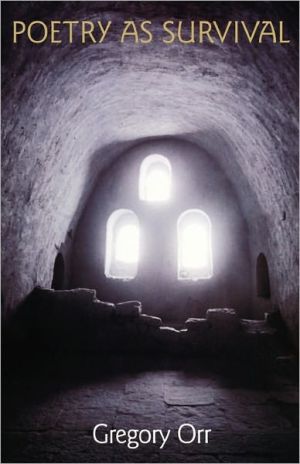

 |

|

The average rating for Poetry As Survival based on 2 reviews is 4.5 stars.
Review # 1 was written on 2018-11-29 00:00:00 Credell Reynolds Credell ReynoldsIn lieu of review, here are links to not one, not two, not three, but FOUR posts made using quotes and / or poems from Orr's book. Interesting stuff (uh, if you're interested in poetry, that is): "When Something Strange Pounds on Your Door" "When the World Slaps You, Poetry..." "When I Becomes Us, the Poet Wins" "The Mysterious Equations of Narrative Poetry, Where Less Is More" |
Review # 2 was written on 2015-01-02 00:00:00 Kathleen Peist Kathleen PeistAnyone who writes poetry must read this book. Anyone who reads poetry must read this book. Anyone who teaches poetry MUST read this book. Anyone who has suffered trauma must read this book. Anyone who works with people who have suffered trauma, must read this book. This book is not an easy read - it is not a popular market, easy reading memoir. It is a well-researched and well-written analysis of how and why poetry is vital to our survival as humans. How it allows us to cope with the stresses and traumas of being human - how writing poetry, or reading poetry, can keep us alive when life seems like it is tearing us apart. And all this is done, not just by looking at so many of the great authors, like Keats, Blake, Dickinson, Whitman, Plath, etc., but also through Gregory Orr's own gorgeous and eloquent prose and analysis. He writes: "We must, the personal lyric tells us, become vulnerable to what is out there (or inside us). Not in order to be destroyed or overwhelmed by it, but as part of a strategy for dealing with it and surviving it. Lyric poetry tells us that it is precisely by letting in disorder that we will gain access to poetry's ability to help us survive." (47) "When I write a poem to help myself cope with a serious disturbance, I do so by registering the disorder that first destabilized me and then incorporating it into the poem. The literary result is the poem of survival." (130) "The very hopelessness of the shattered self is its hope, because this devastated self possesses a radical freedom . . . . The self is . . . free to make new connections to the world." (121) "What certain poets of trauma intuit is that their old self cannot survive the suffering it has experienced without succumbing. Thus necessity permits and compels imagination to create a new self, a self strong enough or different enough to move through and beyond the trauma and its aftermath." (121) "Surely, we would be right to say that trauma is, by definition among the fiercest and most destructive forms disorder can take. Trauma, either on an intimate or collective scale, has the power to annihilate the self and shred the web of meanings that supports its existence. And yet the evidence of lyric poetry is equally clear - deep in the recesses of the human spirit, there is some instinct to rebuild the web of meanings with the same quiet determination s we witness in the garden spider as it repairs the threads winds and weather have torn." (132) I could go on and on, but most of the other quotes only work in context of the poems that he is discussing, which is one of the main strengths of this book, that he doesn't deal in abstracts, but rather in well researched specifics, obviously pulling from a deep well of knowledge. If you like to learn, and be challenged by what you read, read this book. If you are looking for fluff, then don't read it. I, for one, loved this book. My favorite non-fiction book so far all year. |
CAN'T FIND WHAT YOU'RE LOOKING FOR? CLICK HERE!!!